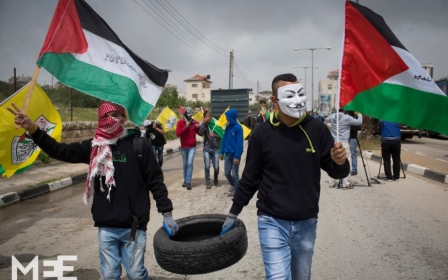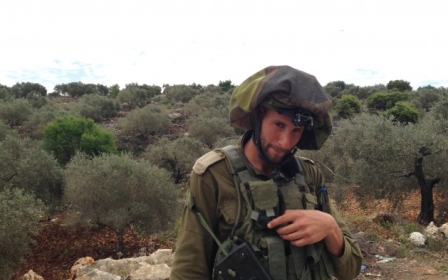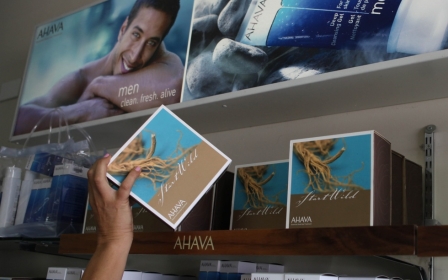Palestinian Prisoners Day: 'My little brothers are missing my dad'

RAMALLAH, Occupied Territories - More than most villages in the occupied West Bank, residents of Beit Ummar know the meaning of Prisoners Day - in a population where 44 percent of men have been imprisoned at some point in their lives.
This month alone, two men from the same family in the village died due to Israeli actions. At the beginning of April, 22-year-old Jafar Awad, who had been arrested on charges of belonging to Islamic Jihad, died of pneumonia three months after being released from prison on the grounds of ill health. At Jafar’s funeral, Ziyyad Awad, a relative, was also killed, allegedly by Israeli gunfire. This is hardly unusual in a village where restrictions, protests and night-time home raids by Israeli troops have become normal, and where most residents have a relative who is currently in jail.
With 6,000 Palestinians currently incarcerated in Israeli jails, Prisoners Day is a significant date in the political calendar. In the West Bank, flags bearing the faces of high-profile detainees are flown in city squares; on Friday, protests for those who are incarcerated will take place in towns and at well-known occupation flashpoints.
The spotlight here is on those men and women who are behind bars, many of whom have been imprisoned for years. But the impact of mass incarceration on the Palestinian population extends much further than the number of arrested and detained individuals. For the families and communities of those who are imprisoned, it's a phenomenon that affects all areas of life.
“When a parent is arrested and imprisoned, what the family is losing is their source of safety, their source of money, their future,” Muna Ammar, the director of the Centre for Freedom and Justice in Beit Ummar, told Middle East Eye. “It’s a circle. Once you start, you never end. The problems continue, and the suffering continues, and the arrests continue as these children try and get rid of the anger they’re holding.”
Beit Ummar, Ammar's home, has been particularly affected by the extent of incarceration. Increasingly encircled by a cluster of settlements, the village has suffered decades of land seizures and movement restrictions as a result of Israeli occupation. A dark grey military watchtower hovers over Beit Ummar’s main road.
Uncertain future
Nidal Abu Maria is familiar with this cycle. Last year, the 26-year-old lost his uncle, children's rights defender Hashem Abu Maria, to an Israeli army bullet; not long after, his father, Ahmad, and teenage brother, Qassam, were arrested from Beit Ummar. They remain in jail, with current legal procedures suggesting that Ahmad may be sentenced to five years. Without their main breadwinner, the family faces an uncertain future.
“It’s been really hard for my family because my father, he was the only one that used to work,” Nidal explained. “My little brothers are missing him – I have three: seven, nine and 15 years. The Israelis still crash into the house many times, too, and it affects them every time they come into the village.
“We also don’t have any money,” he continued. “I feel more responsible now, to look for a job.”
A university graduate, Nidal hoped to travel and study for a masters degree in the future. His father's arrest, however, means those plans have had to be swiftly abandoned. Now, the necessity to support his family means finding any job must take primary consideration, although in the West Bank the opportunities for well-paid work are profoundly limited.
“I had a plan to travel to Europe, looking for my own life, but now it’s changed everything. I’m just trying to find a way to get money to help my family. I gave up my plan about doing my masters. At least not for five years, when my dad is out of the prison.
“I don’t have a permit to work in Israel, and I thought about going there to get work, but my mum prevented me. She said, ‘Your father is in jail, your brothers in jail, you can’t go to jail too',” Nidal said.
Although he was recently offered a job with a government agency, delays in the implementation of the project mean he still has no income and he's unsure when, or if, the possibility of employment will bear fruit.
“I'm just waiting for the job. I'm meant to be waiting until this month, but I don't know what will happen,” Nidal continued. “My mother's telling me all the time 'no pressure, no pressure', but it’s just because she doesn’t want me to be sad. She knows that I gave up all my plans for my personal life.
“My brother is now working in this factory where he gets 1,300 shekel a month, which isn't even enough for his transportations. He wants to try and work in Israel, but I don't want him to do that. It's enough for one of us to give up everything about his personal life, and to support his family. I'll do it. I'm the oldest, I finished my studies. We don't need to destroy the whole family.”
Secondary consequences
As a community organiser in Beit Ummar, Ammar has seen many cases like Nidal's. The burden of supporting a family, she explained, is exacerbated by secondary consequences of the arrest of a relative. Once someone has spent a period in jail, the members of their immediate family will find it difficult, if not impossible, to obtain a permit to work in Israel. In the West Bank, where the economy is struggling, permissions to cross the wall are often essential for finding work at all, and that means levels of unemployment in Beit Ummar are uncharacteristically high.
“The people are suffering because of this. We have lots of social problems,” Ammar explained. “The youth have nothing but free time and they spend it in the street, which puts them at risk of disastrous problems, things like fighting and drugs. I can say that the youth are losing their faith in the future.”
The fracturing of the family unit and the community at large that follows arrest, she said, leads to further social problems. “When you have a family with no economic means, it’s bad for the women, the kids, the whole family. We have high levels of divorce here in Beit Ummar, among young people as well as older couples.
“Because we are a constricted community, too, when a man is arrested, a woman’s father or brothers will start controlling her because she doesn’t have a husband any more. So as well as taking their income away from them, the arrests continue the desperation, isolation and the frustration of women and their families.”
While male family members are more likely to be imprisoned in Israeli jails than women, it is mothers and sisters that are most often affected by the social consequences of prison in the family and community. That's especially marked when children are arrested – a common phenomenon in Beit Ummar. In 2012, an estimated 87 children were arrested in the village, out of a total of 189 arrests.
“For children, imprisonment causes a great deal of suffering, because the child is taken from his family, and left to the soldiers by himself,” Ammar explained, adding that minors may be beaten or verbally abused by troops. “They are taken away from their family for several months. We often have children arrested for six months or more. When they return, they prefer not to go back to school. And because of that, they have no qualifications, no job, no future. They become more withdrawn and violent. And because of that they’re more likely to suffer arrest again.”
Speaking in Ramallah, Nidal is pained by the knowledge that his younger brother is likely to be affected by arrest in this way. “When I speak with my father or my brother, when they call from jail, it’s a bit hard, you know,” he said. “Especially when I talk to my brother. This guy lost his school because of jail, because he went to jail twice before this time, and he lost his future. He just wants to go home.”
In the meantime, there's little left for Nidal to do but try his best to support his family. For the foreseeable future, the outlook is unclear.
“The plan is to give up all my plans. That’s the plan. To give up all my plans about my personal life, to find a job to help my family, to help my brothers,” he said. “That’s my biggest wish.”
New MEE newsletter: Jerusalem Dispatch
Sign up to get the latest insights and analysis on Israel-Palestine, alongside Turkey Unpacked and other MEE newsletters
Middle East Eye delivers independent and unrivalled coverage and analysis of the Middle East, North Africa and beyond. To learn more about republishing this content and the associated fees, please fill out this form. More about MEE can be found here.




